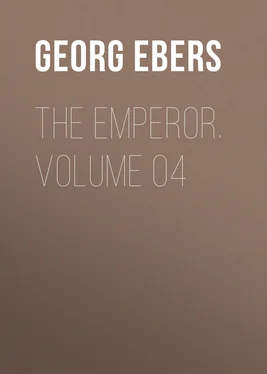Georg Ebers - The Emperor. Volume 04
Здесь есть возможность читать онлайн «Georg Ebers - The Emperor. Volume 04» — ознакомительный отрывок электронной книги совершенно бесплатно, а после прочтения отрывка купить полную версию. В некоторых случаях можно слушать аудио, скачать через торрент в формате fb2 и присутствует краткое содержание. Жанр: Альтернативная история, foreign_antique, foreign_prose, Исторические приключения, на английском языке. Описание произведения, (предисловие) а так же отзывы посетителей доступны на портале библиотеки ЛибКат.
- Название:The Emperor. Volume 04
- Автор:
- Жанр:
- Год:неизвестен
- ISBN:нет данных
- Рейтинг книги:3 / 5. Голосов: 1
-
Избранное:Добавить в избранное
- Отзывы:
-
Ваша оценка:
- 60
- 1
- 2
- 3
- 4
- 5
The Emperor. Volume 04: краткое содержание, описание и аннотация
Предлагаем к чтению аннотацию, описание, краткое содержание или предисловие (зависит от того, что написал сам автор книги «The Emperor. Volume 04»). Если вы не нашли необходимую информацию о книге — напишите в комментариях, мы постараемся отыскать её.
The Emperor. Volume 04 — читать онлайн ознакомительный отрывок
Ниже представлен текст книги, разбитый по страницам. Система сохранения места последней прочитанной страницы, позволяет с удобством читать онлайн бесплатно книгу «The Emperor. Volume 04», без необходимости каждый раз заново искать на чём Вы остановились. Поставьте закладку, и сможете в любой момент перейти на страницу, на которой закончили чтение.
Интервал:
Закладка:
"I am," replied the old man, and as soon as he learnt what Mastor required as a commission from the controlling architect, he pointed out some young slaves who quickly brought the water that he needed.
Pontius met the Emperor's servant and his water-carriers and remarked, loudly enough for Mastor to understand him, to Pollux who was with him:
"The architect's servant is getting Christians to wait upon his master to-day. They are regular and sober workmen who do their duty silently and well."
While Mastor was giving his master towels, and helping to dry and dress him, he was far less attentive than usual, for he could not get the words he had heard from the overseer's lips out of his mind. He had not understood them all, but he had fully comprehended that there was a kind and loving God who had suffered in his own person the utmost torments, who was especially gracious to the poor, the miserable, and the bondsman, and who promised to refresh them and comfort them, and to re-unite them to those who had once been dear to them. "Come unto me," sounded again and again in his ears, and struck so warmly to his heart that he could not help thinking first of his mother, who, so many a time, when he was a child, had called to him only to clasp him in her arms as he ran towards her, and to press him to her heart. Just so had he often called his poor little dead son, and the feeling that there could be any one who might still call to him—the forsaken lonely man—with loving words to release him from his griefs, to reunite him to his mother, his father, and all the dear ones left behind in his lost and distant home, took half the bitterness from his pain.
He was accustomed to listen to all that was said in the Emperor's presence, and year by year he had learnt to understand more of what he heard. He had often heard the Christians discussed, and usually as deluded but dangerous fools. Many of his fellow-slaves, too, he had heard called Christian idiots, but still not unfrequently very reasonable men, and sometimes even Hadrian himself, had taken the part of the Christians.
This was the first time that Mastor had heard from their own lips what they believed and hoped, and now, while fulfilling his duties he could hardly bear the delay before he could once more seek out the old pavement-worker, to enquire of him, and to have the hopes confirmed which his words had aroused in his soul.
No sooner had Hadrian and Antinous gone into the living-room than Mastor had hastened off across the court to find the Christians. There he tried to open a conversation with the overseer concerning his faith, but the old man answered that there was a season for everything; just now he could not interrupt the work, but that he might come again after sundown, and that he then would tell him of Him who had promised to refresh the sorrow-laden.
Mastor thought no more of making his escape. When he appeared again in his master's presence there was such a sunny light in his blue eyes that Hadrian left the angry words he had prepared for him unspoken, and cried to Antinous, laughing and pointing to the slave:
"I really believe the rascal has consoled himself already, and found a new mate. Let us, too, follow the precept of Horace, so far as we may, and enjoy the present day. The poet may let the future go as it will, but I cannot, for, unfortunately, I am the Emperor."
"And Rome may thank the gods that you are," replied Antinous.
"What happy phrases the boy hits upon sometimes," said Hadrian with a laugh, and he stroked the lad's brown curls. "Now till noon I must work with Phlegon and Titianus, whom I am expecting, and then perhaps we may find something to laugh at. Ask the tall sculptor there behind the screens, at what hour Balbilla is to sit to him for her bust. We must also inspect the architect's work, and that of the Alexandrian artists by daylight; that, their zeal has well deserved."
Hadrian retired to the room where his private secretary had ready for him the despatches and papers for Rome and the provinces, which the Emperor was required to read and to sign. Antinous remained alone in the sitting-room, and for an hour he continued to gaze at the ships which came to anchor in the harbor, or sailed out of the roads, and amused himself with watching the swift boats which swarmed round the larger vessels, like wasps round ripe fruit. He listened to the songs of the sailors, and the music of the flute-players, to the measured beat of the oars, which came up from the triremes in the private harbor of the Emperor as they went out to sea. Even the pure blue of the sky and the warmth of the delicious morning were a pleasure to him, and he asked himself whether the smell of tar, which pervaded the seaport, were agreeable or not.
Presently as the sun mounted in the sky, its bright sphere dazzled him; he left the window with a yawn, stretched himself on a couch, and stared absently up at the ceiling of the room without thinking of the subject which the faded picture on it was intended to represent.
Idleness had long since grown to be the occupation of his life; but accustomed to it as he was, he was sometimes conscious of its dark attendant shadow ennui—as of a disagreeable and intrusive interruption to the enjoyment of life. Generally in such lonely hours of idle reverie his thoughts reverted to his belongings in Bithynia, of whom he never dared to speak before the Emperor, or perhaps of the hunting excursions he had made with Hadrian, of the slaughtered game, of the fish he—an experienced angler—had caught, or such like. What the future might bring him troubled him not, for to the love of creativeness, to ambition —to all, in short, that bore any resemblance to a passionate excitement his soul had, so far, remained a stranger. The admiration which was universally excited by his beauty gave him no pleasure, and many a time he felt as though it was not worth while to stir a limb or draw a breath. Almost everything he saw was indifferent to him excepting a kind word from the lips of the Emperor, whom he regarded as great above all other men, whom he feared as Destiny incarnate, and to whom he felt himself bound as intimately as the flower to the tree, the blossom that must die when the stem is broken, on which it flaunts as an ornament and a grace.
But, to-day, as he flung himself on the divan his visions took a new direction. He could not help thinking of the pale girl whom he had saved from the jaws of the blood-hound—of the white cold hand which for an instant had clung to his neck—of the cold words with which she had afterwards repelled him.
Antinous began to long violently to see Selene. That same Antinous, to whom in all the cities he had visited with the Emperor, and in Rome particularly, the noble fair ones had sent branches of flowers and tender letters, and who nevertheless, since the day when he left his home, had never felt for any woman or girl half so tender a sentiment, as for the hunter the Emperor had given him, or for the big dog. This girl stood before his memory like breathing marble. Perchance the man might be doomed to death who should rest on her cold breast, but such a death must be full of ecstasy, and it seemed to him that it would be far more blissful to die with the blood frozen in his veins, than of the too rapid throbbing of his heart.
"Selene," he murmured, now and again, with soft hesitation; a strange unrest foreign to his calm nature seemed to propagate itself through all his limbs, and he who commonly would be stretched on a couch for hours without stirring, lost in dreams, now sprang up and paced the room, sighing deeply, and with long strides.
It was a passionate longing for Selene that drove him up and down, and his wish to see her again crystallized into resolve, and prompted him to contrive the ways and means of meeting her once more before the Emperor's return.
Читать дальшеИнтервал:
Закладка:
Похожие книги на «The Emperor. Volume 04»
Представляем Вашему вниманию похожие книги на «The Emperor. Volume 04» списком для выбора. Мы отобрали схожую по названию и смыслу литературу в надежде предоставить читателям больше вариантов отыскать новые, интересные, ещё непрочитанные произведения.
Обсуждение, отзывы о книге «The Emperor. Volume 04» и просто собственные мнения читателей. Оставьте ваши комментарии, напишите, что Вы думаете о произведении, его смысле или главных героях. Укажите что конкретно понравилось, а что нет, и почему Вы так считаете.












